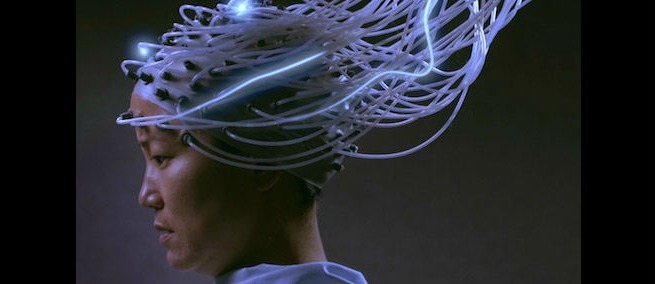
The transference of human consciousness to another vessel is a common trope in science fiction films, but few explore the concept with the thoughtfulness of Jennifer Phang’s Advantageous, now streaming on Netflix.
In a future that, save for the low-flying spaceships and sleek city skyline, looks not unlike our present, Gwen Koh (Jacqueline Kim) is a single mother to her daughter Jules and works as the spokeswoman for the vaguely and ominously named Center for Advanced Health and Living, promoting cosmetic surgeries and advising women to “be the you you were meant to be.” When Gwen inquires about a raise to afford an elite preparatory school for Jules, she’s informed that she has aged out of her position; they’re seeking a younger, more universal spokeswoman. Desperate to hold onto her job and secure Jules’ future, Gwen elects to act as the human trial for a procedure that transfers her consciousness into a new, younger body: she’d be the new face of the Center, and a perfect marketing hook for the procedure. This represents a new take on an old trope—rarely have we seen a human consciousness transferred for the sake of job security. As Gwen says to a colleague who cautions her to find another way, “The point is to push the product, right?”
Despite the flying vehicles, Phang’s world is more reminiscent of Margaret Atwood than Star Trek, with women clearly at a societal disadvantage; in an early mother-daughter moment, Jules looks up at her mother and asks, “Are women really going backwards going forward?” When Gwen first loses her job, she seeks other employment, but the only other career prospect is as an egg donor—infertility is rampant in this future, with even Jules aware that she may be infertile by age 20. Gwen laments that so many women are out of work, questioning whether she’s become too old to be of any use. It’s an almost medieval perspective, with women idolized yet diminished; the city skyline is dominated by the Center, topped by a massive fountain sculpted in the shape of a woman’s torso, but in Jules and Gwen’s apartment building, both upstairs and downstairs neighbors are women frequently in tears. The Center is even run by a woman (Jennifer Ehle), who encourages the transference for Gwen as the way to get ahead. In selecting her next body, co-writers Phang and actress Jacqueline Kim examine not just Gwen’s challenges as an aging woman, but as an aging minority woman; the Center delicately explains that they are seeking a spokeswoman who is “more universal,” offering photos of young, white women as potential successor vessels for her consciousness.
Though the procedure is billed as a seamless, pain-free jump into a new body, it’s quickly revealed to be anything but; Gwen learns that her new body will require a shot every two hours for one year to remain breathing, with constant physical and emotional pain. Fisher (James Urbaniak), a senior employee at the Center and Gwen’s confidant, admits that the technology hasn’t quite reached the point of a seamless transition: “It’s not your consciousness in a jar being dumped into another jar.” She moves ahead despite her misgivings, asking Jules for help selecting her new body. Connected to a device fittedover her skull with the faint electric lights of her consciousness traveling along the wires, Gwen is transferred to her successor vessel (Freya Adams).
It’s clear that the Center views this as a success—new Gwen leads presentations on the procedure, and more and more women complete transference. But in a late reveal, Fisher explains the truth behind the operation—electrodes were connected to Gwen’s brain and to the new host brain, cloning her mind and transferring her memories but not her individual consciousness. New Gwen is merely a clone; the original Gwen is gone. The procedure is not consciousness in a jar being dumped into a new jar—it’s cloning the jar then smashing the original. It’s frightening in concept, but the film is far less compelling after Gwen is transferred, losing the urgency that accompanied her emotional struggle leading up to the procedure and leaving much unanswered.
The dystopian future that Advantageous exists in is alarming in how much it resembles the present, amplified to a scale that doesn’t seem impossible. At the beginning of the film, Gwen explains that the treatments that the Center offers are alternatives to invasive, scarring cosmetic surgeries. If Advantageous represents what’s to come, cosmetic surgery doesn’t seem so bad.